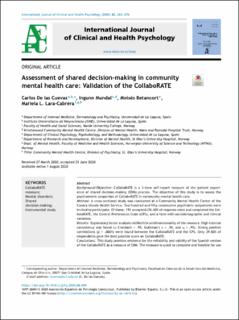Assessment of shared decision-making in community mental health care : validation of the CollaboRATE
Peer reviewed, Journal article
Published version

View/
Date
2020Metadata
Show full item recordCollections
- Institutt for psykisk helse [1221]
- Publikasjoner fra CRIStin - NTNU [37963]
- St. Olavs hospital [2490]
Original version
International Journal of Clinical and Health Psychology. 2020, 20 (3), 262-270. 10.1016/j.ijchp.2020.06.004Abstract
Background/Objective: CollaboRATE is a 3-item self-report measure of the patient experience of shared decision-making (SDM) process. The objective of this study is to assess the psychometric properties of CollaboRATE in community mental health care. Method: A cross-sectional study was conducted at a Community Mental Health Center of the Canary Islands Health Service. Two hundred and fifty consecutive psychiatric outpatients were invited to participate. Of those, 191 accepted (76.40% of response rate) and completed the CollaboRATE, the Control Preferences Scale (CPS), and a form with sociodemographic and clinical variables. Results: Exploratory factor analysis ratified the unidimensionality of the measure. High internal consistency was found (α Cronbach = .95, Guttman's λ = .93, and ω = .95). Strong positive correlations (p < .0001) were found between the CollaboRATE and the CPS. Only 39.80% of respondents gave the best possible score on CollaboRATE. Conclusions: This study provides evidence for the reliability and validity of the Spanish version of the CollaboRATE as a measure of SDM. The measure is quick to complete and feasible for use in outpatient mental health care. At present, a significative number of psychiatric outpatients are not involved in SDM. The use of this measure in psychiatric routine care can be a key tool in assessing and implementing SDM. Keywords: CollaboRATE measure, mental disorders, shared decision-making, instrumental study Antecedentes/Objetivo: CollaboRATE es un autoinforme de tres ítems que permite al paciente valorar su experiencia en la toma de decisiones compartidas (TDC) sobre su tratamiento. El objetivo de este estudio fue evaluar las propiedades psicométricas de CollaboRATE en la atención comunitaria de salud mental. Método: Se realizó un estudio transversal en una Unidad de Salud Mental del Servicio Canario de la Salud. Doscientos cincuenta pacientes psiquiátricos ambulatorios consecutivos fueron invitados a participar y 191 aceptaron (76,40%). Los pacientes completaron el CollaboRATE, la Escala de Preferencias de Control (EPC), y un formulario con variables sociodemográficas y clínicas. Resultados: El análisis factorial exploratorio ratificó la unidimensionalidad de la medida. Se encontró una alta consistencia interna (α Cronbach = 0,95; Guttman's λ = 0,93; y ω = 0,95). Se registraron significativas correlaciones positivas (p < 0,0001) entre CollaboRATE y el EPC. Solo el 39,80% de los encuestados dieron la mejor puntuación posible en CollaboRATE. Conclusiones: La versión en español de CollaboRATE es una medida fiable y válida de TDC, rápida de completar y factible para su uso en Psiquiatría comunitaria. En la actualidad, pocos pacientes psiquiátricos son involucrados en TDC. CollaboRATE puede ser una herramienta clave para evaluar e implementar la TDC en la atención psiquiátrica ambulatoria. Palabras clave: CollaboRATE, trastornos mentales, toma de decisiones compartidas, estudio instrumental
